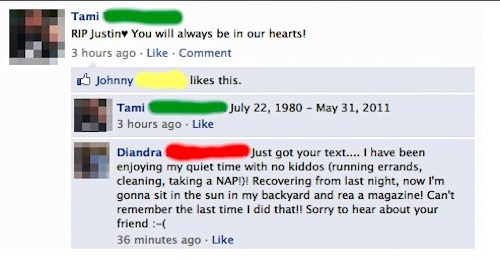A fun thing my brother and I talked about during Combat! blog’s long rest was that Facebook use is declining among teenagers. For whatever reason—we posited that it was because Facebook is all pictures of babies now when it used to be cool bands and people you hooked up with, although that may just be our user experience—kids prefer Snapchat or Vine or Twist or Goob. Which is interesting, because Facebook sold itself as a service. It arguably just pulled off a multibillion-dollar IPO as a service. Facebook is the premiere social network, as we all know from that movie Citizen Kane. But maybe it is the perennial social network of a certain group of people. Facebook isn’t a service; it’s a cadre.
That’s probably a hard claim to swallow, since everybody is on Facebook. Actually, though, everyone you know is on Facebook. There’s a whole nation of weird outliers who are not on Facebook at all.
Cast your mind back to the dim year 2006. Rupert Murdoch had just made the most hilarious mistake of his career by purchasing Myspace. Occasionally would meet people who were on Myspace instead of Facebook, but there weren’t enough of them to make you use the site.
Mostly it was the shrill backgrounds and pop-up audio, but also there was a social divide. Since we’re in the realm of baseless and possibly damaging conjecture, I’m going to say that Myspace people were slightly trashier than Facebook people.
When the iPhone came out in 2007, it did not come with a Myspace app. People who bought smartphones, who lived in urban areas, who worked in professional fields signed up for Facebook. It started on the campus of a well-known college, after all. And while I always assumed that the people who left Myspace signed up for Facebook, that’s not necessarily true. Plenty of them didn’t know enough people on Facebook to leave Myspace, and so they stuck with their social network until it withered and died.
Meanwhile, Facebook people were, by definition, people who knew people who were already on Facebook. In the early accretions, they clustered around Harvard; then they clustered around a certain median education and income. They used the site for its one valuable function: hooking up.
The widespread adoption of Facebook—which at one time allowed you to see the profiles of your friends’ friends but not a degree of separation further—removed the imperative to formally exchange contact information from hookup culture. It was now possible to meet someone at a party, go home with him or her, and leave courteously in the morning without asking for a phone number.
As anyone will tell you, asking for a phone number is the hardest part. It’s the moment where you explicitly declare interest, which makes it terrifying and arguably antithetical to seduction, but that’s for another post. My point is that strangers who hooked up at parties and could find each other on Facebook later kept open the lines of communication, and a statistically significant number of them subsequently coupled off. Now they are beginning to post pictures of their kids on Facebook.
It seems inevitable in retrospect. It also explains why young users are dropping off. The urban professionals in their mid-twenties who made Facebook’s user base so fun and interesting in 2006 are now urban professionals in their early thirties, which is prime time for settling down and starting a family. That’s fun and interesting with people you already know, but it’s not the kind of user base that goes out and convinces new people to sign up.* ![]()
So perhaps Facebook is a closed network. It’s still a robust siphon for sucking marketing data from the users caught in its screens, but those users are a particular demographic group. Insofar as they have the same friends, like the same bands and retailers and got into social networking around they same time, they are a segment of America. Facebook has essentially invested $100 billion in knowing them.
Information about that cadre is Facebook’s tangible asset. Or, to put it from another perspective, we are that tangible asset. Which brings us to an interesting question: If Facebook is a cadre, not a service, what service does it now provide to us?





I’m going to raise your rhetorical question with a facile answer.
Facebook lets me press my ear up to the heart of my network and keep touch with its cultural heartbeat. I’m too focused on my own research to create my own feed/digest of whatever Miley Cyrus bullshit other people are preoccupied by, so Facebook delivers a summary which allows the minimum time investment required to maintain cultural literacy. In this sense it is indistinguishable from news. The news.
Also, while Facebook algorithmically selects for stories I would be most interested in hearing about, due to the huge volume of those I am not it still serves some cultural voyeurism which allows us to define my own identity under the guise of being entertained. Speaking for my network, Facebook is a healthy way to articulate who we are–which seems to be the prime occupation of humans who have their food, shelter, and other basic needs met.
As a piece of machinery, Facebook is platform for engaging in written debate, sharing links, and doing outreach for my organization. It’s super valuable for that. At the heart (nearby artery) of a person’s social network, Facebook is a frequently very visited site. If you blast your organization’s updates on Facebook, people who want to stay in touch can do so easily, with little effort. Make them open your email, or check your hand-built webpage and you’ve added a small barrier, lost the user’s interest. For the organizations, Facebook is like an automated webpage builder that guarantees your final product will be familiar and acceptable to users. It’s great.
But maybe the platform of choice is subject to generational cadreism and will change every 10 years.